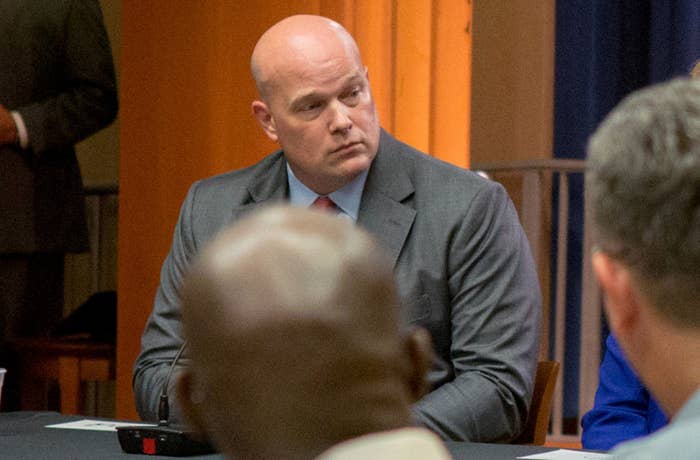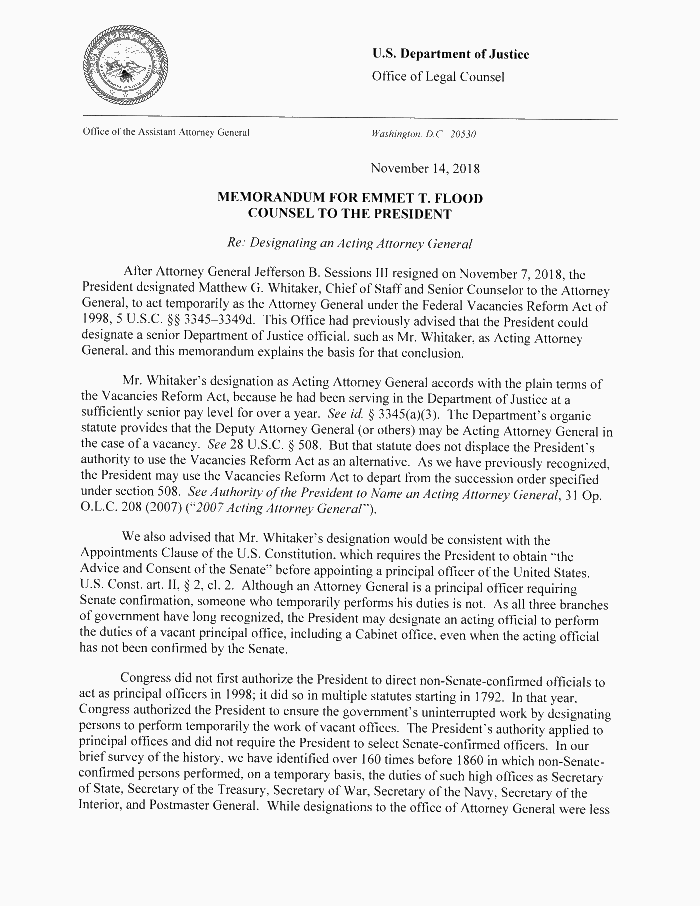
The Justice Department previously advised the White House that President Donald Trump could appoint someone like acting attorney general Matthew Whitaker — who has not been confirmed by the Senate — to the role, according to a new memorandum from the department’s Office of Legal Counsel.
Many lawyers have questioned and a challenge already is pending as to whether Whitaker’s appointment — which followed former attorney general Jeff Sessions’ forced resignation — violates federal law or the US Constitution. The Justice Department memorandum, dated Wednesday, attempts to push back on those arguments.
“The constitutionality of Mr. Whitaker’s designation as Acting Attorney General is supported by Supreme Court precedent, by acts of Congress passed in three different centuries, and by countless examples of executive practice,” the head of the Office of Legal Counsel, Assistant Attorney General Steven Engel wrote.
In a call with reporters, a senior Justice Department official discussed the opinion, but declined to say when the initial advice about the potential appointment was provided to the White House.
The official noted the extensive history of non–Senate-confirmed individuals taking on “acting” roles, saying that the office found more than 160 such examples throughout US history. Specifically, the official noted that former president Barack Obama had made such appointments.
The official also noted that there was an acting attorney general appointed by president Andrew Johnson in 1866 who had not previously been confirmed by the Senate.
The memorandum is directed to Emmet Flood, the attorney who joined the White House as special counsel to the president for the Russia investigation but is currently serving as White House counsel since Donald McGahn’s departure. Pat Cipollone had been announced as the next White House counsel but is yet to join the White House, a spokesperson confirmed Wednesday.
The opinion addresses whether Whitaker’s appointment is covered by a 1998 law known as the Federal Vacancies Reform Act, which Trump used to appoint Whitaker; whether another law specifically addressing succession at the Justice Department means that Trump cannot use the more general 1998 law to make an appointment; and whether the appointment of someone who has not been confirmed by the Senate is allowed under the Constitution’s Appointments Clause.
The opinion concluded that the 1998 law applies, which allows the president to appoint various people to serve for a limited time as an “acting” official in the case of a vacancy. The law says that the “acting” individual defaults to the “first assistant,” which would be Deputy Attorney General Rod Rosenstein at the Justice Department, but it allows the president to designate any Senate-confirmed individual or any person within the department who is at a senior level and has been there for more than three months to the “acting” role.
Here, Trump chose Whitaker, who was Sessions’ chief of staff and had been since last fall.
The opinion also concluded, as the Office of Legal Counsel had previously, that a specific statute laying out the order of succession at the Justice Department does not supplant the 1998 law.
Finally, it addressed the Appointments Clause, which requires all principal officers like the attorney general to receive the “advice and consent of the Senate” to serve. Inferior officers, however, can be appointed by the president, courts, or heads of departments without Senate confirmation if Congress allows it.
“Although the attorney general is a principal officer, it does not follow that an acting attorney general should be understood to be one,” Engel wrote in the opinion. The opinion details the “historical practice,” from an act passed when George Washington was president, that allowed the president to name acting heads of several departments, concluding that the practice “strongly supports the constitutionality of authorizing someone who has not been Senate-confirmed to serve as an acting principal officer.”
Zoe Tillman contributed reporting to this story.
This is a developing story. Check back for updates and follow BuzzFeed News on Twitter.
CORRECTION
Donald McGahn’s name was misspelled in an earlier version of this post.

